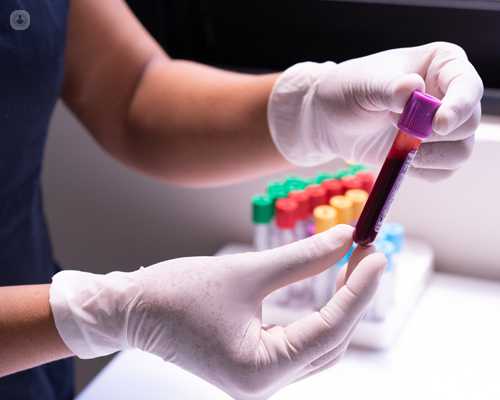Hyperprolactinaemia
Dr Syed Haris Ahmed - Endocrinology, diabetes & metabolism
Created on: 06-22-2016
Updated on: 06-21-2023
Edited by: Karolyn Judge
What is hyperprolactinaemia?
Hyperprolactinaemia is a condition caused by abnormally high levels of prolactin in the blood. Prolactin is a hormone produced by a gland located at the base of the head. In women, it is responsible for milk production during pregnancy (galactorrhoea) and for breast development during puberty (together with oestrogen). In men, it is associated with sexual desire, gynaecomastia and impotence. One of its functions is indeed to lower testosterone levels and to mobilise fatty acids.

What is the outlook for hyperprolactinaemia?
Usually, the outlook for hyperprolactinaemia greatly depends on what causes it, on your age and overall state of health.
What are the symptoms of hyperprolactinaemia?
One of the most common symptoms in hyperprolactinaemia in women is an alteration in the menstrual pattern.
- Other symptoms in women include vaginal dryness, milk production not associated with childbirth, low progesterone levels after ovulation, oligomenorrhoea, and amenorrhoea;
- In men, the symptoms include gynaecomastia (an increase in the size of male breast tissue), impotence, sexual desire reduction, infertility, muscle mass loss, and body hair loss.
What causes hyperprolactinaemia?
You will need to do a blood test to check the levels of prolactin in your blood. Should prolactin levels be elevated, you will do a CT scan (specifically looking at the pituitary gland and hypothalamus) to determine whether there are microadenomas or adenomas in the pituitary gland or nearby it. In case there’s a tumour mass in the optic chiasma, you may experience vision disorders. In that case, you should do a visual field test.
What causes hyperprolactinaemia?
Hyperprolactinaemia can be caused by various factors.
- Pregnancy
- Puerperium, also known as the post-partum period
- Stress
- Exercising
- Sleep;
- High protein intake;
- Breastfeeding;
- Sexual intercourse;
Other causes of hyperprolactinaemia include:
- Pituitary adenoma and prolactinoma (a benign tumour that secretes prolactin);
- Non-secretory pituitary adenomas;
- Acromegaly;
- Empty sella syndrome (ESS);
- Cushing's syndrome;
- Meningioma (malignant tumour of the three layers that protect the brain and spinal cord);
- Testicular cancer;
- Sarcoidosis;
Pharmacological causes or drug-induced hyperprolactinaemia:
- Antidepressants;
- Anti-epileptic drugs;
- Hypertension medication;
- Anti-nausea and vomiting medicine;
- Antihistamines;
Other causes of hyperprolactinaemia include:
- Herpes (shingles) lesions;
- Spinal injury;
- Hypothyroidism;
- Kidney failure;
- Cirrhosis;
- Adrenal insufficiency;
How is hyperprolactinaemia treated?
Asymptomatic hyperprolactinaemia requires no special treatment. In other cases, treatment for hyperprolactinaemia largely depends on what causes it.
Which specialist treats hyperprolactinaemia?
To accurately diagnose and treat hyperprolactinaemia, you should see an endocrinologist.
